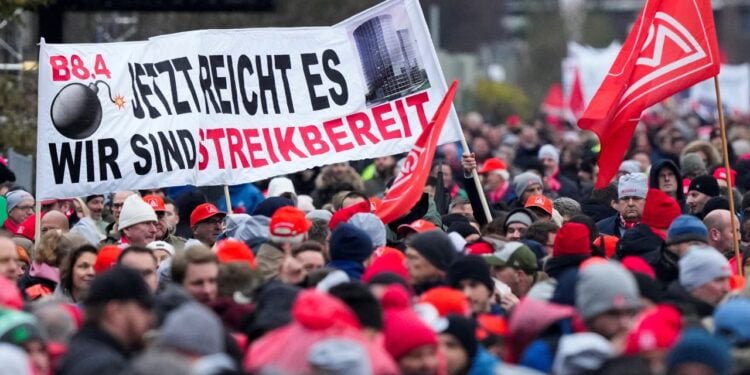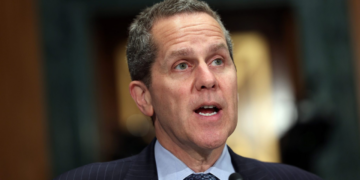Volkswagen workers said its management had one last chance to compromise on Monday or risk strikes on a scale not previously seen by the German carmaker, as talks began in a bitter standoff over wage cuts and plant closures.
VW staff downed tools at nine German sites which are under threat, while thousands of workers marched waving flags and blowing whistles in a square in Wolfsburg, where the carmaker has its headquarters, to listen to union leaders.
The latest negotiations, which initially kicked off in September, come as Europe’s largest carmaker seeks ways to radically cut costs in Germany to better compete with cheaper Asian rivals that have entered its home market.
Last week’s strikes at VW’s four carmaking factories cost Volkswagen just under 40,000 euros ($42,308) per minute, a source close to the company told Reuters.
The VW crisis has hit at a time of uncertainty and political upheaval in Europe’s largest economy, as well as wider turmoil among the region’s automakers. German Chancellor Olaf Scholz, who is trailing in polls ahead of a snap election, warned VW against factory closures over the weekend.
Some 38,000 workers went on strike for four hours in Wolfsburg from the early and middle shifts alone, with the late and night shifts still to follow, the IG Metall union said.
The strikes are already more widespread than the last round of major industrial action at VW in 2018, when more than 50,000 workers went on so-called warning strikes over pay at six sites.
IG Metall said there have never been any real walkouts lasting 24 hours or more beyond so-called “warning strikes,” which are flagged in advance and of limited duration.
VW’s management must signal their readiness to make steeper compromises on factors including their own compensation and the dividend for unions to take forward negotiations this year, a source close to the matter said.
“Today, the workforce is taking a stand in the form of a nationwide warning strike,” union IG Metall chief negotiator Thorsten Groeger said.
Workers, who have dismissed any cuts to wages or plant closures, can crank up the pressure on VW by eventually staging 24-hour strikes and even open-ended ones.
“The New Year’s Eve fireworks will be followed by an escalation that this company has never experienced before,” Groeger said, adding that management had “one last chance” to get back on track in 2024 and find a solution this week or next.
In the 1970s, a last-minute agreement over pay disputes was reached the night before strikes were due to begin.
Cost-Cutting
Volkswagen insists that capacity and wage cuts are needed because demand for cars in Europe has fallen while costs in Germany make it impossible to compete with new rivals.
Its chief negotiator Arne Meiswinkel said unions and management needed to find alternative ways to a solution for its German plants after rejecting a union proposal as unsustainable.
“We continue to need to reduce costs, reduce overcapacity,” Meiswinkel said ahead of the talks, which were taking place at the Volkswagen Arena where the VfL Wolfsburg Bundesliga team plays its soccer.
Thousands gathered, blowing whistles, chanting, booing management and holding signs such as from individual company sections saying “ENOUGH NOW! B2 IS READY FOR THE FIGHT!”
CEO Oliver Blume last week defended Volkswagen Group’s decisions as necessary in a fast-changing environment, saying management could not operate “in a fantasy world.”
Groeger urged VW to move towards the union’s position.
“Trust has been destroyed… workers are very angry. The brand VW is under threat of becoming damaged by the behaviour of the board and the share price has been thrown to the bottom of the basement. That is the board’s responsibility,” he said
Volkswagen’s stock is among the worst performers among European carmakers, having fallen by nearly 25% this year.
While the full impact of the strikes was not immediately clear, the union has said several hundred cars were not built at the Wolfsburg plant alone as a result of the first round.
Automakers face rising competition from China, where EV maker BYD recently said that between August and October it hired close to 200,000 new employees in car and component manufacturing.
($1 = 0.9454 euros)
(Reporting by Victoria Waldersee, Christina Amann, Christoph Steitz, Andrey Sychev; Writing by Matthias Williams; Editing by Kirsten Donovan and Alexander Smith)


















